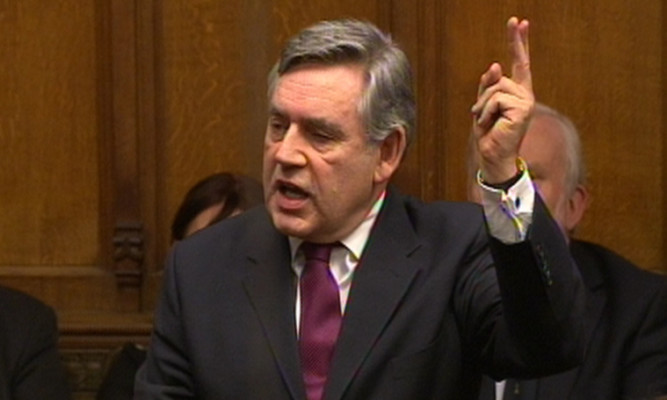One thing many of us hoped for around this time last year was that the referendum would put a stop to Scotland’s preoccupation with itself.
Sadly, there is no sign of that happening even now, as we approach the anniversary of that fateful day.
To give just one example, the Edinburgh Book Festival, which used to be the home of literature, featured events with titles such as ‘A conversation about Scotland’, ‘Scotland and the UK’ and ‘Why Scotland will flourish’.
While the rest of Europe’s focus is on the migrant tragedy on its doorstep, Scotland continues to gaze inward.
If this introspection resulted in a new vision for our public services, perhaps it would be worth it.
But the debate about Scotland never seems to move beyond identity politics and existential angst.
The latest to pontificate on the matter was Gordon Brown.
The former PM has had a few memorable outings this summer, but this one, at the Book Festival, was not his best.
A year after the country rejected Scottish nationalism following a campaign in which Brown played a big if belated role he proposed a review to look into the constitutional question.
This, he said, would take in the views of local authorities and churches on the ‘great issues’, including reform of political institutions.
Please Gordon, no more!
We have already, in a few short years, had the Calman Commission, the referendum, then most recently the Smith Commission. Not one of these has improved the lives of ordinary Scots.
Our unreformed schools lag behind England’s, our NHS is a shambles, and so are our justice system and newly centralised police force.
It’s not as if Scotland has nothing else to do than navel gaze.
Brown knows this, and must also realise that it suits the Scottish nationalists to go on about ‘great issues’ instead of buckling down to the day job, fixing domestic problems.
His intervention now is as much about saving the Labour Party as it is about saving Britain which, he did go on to say, would survive in the long run.
His own party is much less secure, and this might explain why he came up with the odd notion that the Conservatives were to blame for the rise of English nationalism.
The Tories had fostered discontent to ‘get the idea that there was a Scottish menace, a Scottish danger, a Scottish risk it was, I’m afraid, playing the nationalist card’.
He said the creation of English votes for English laws and the ‘refusal’ of Westminster to grant Holyrood more powers (even though it doesn’t use the ones it already has) were driving us apart.
“In the next 12 months I believe the fate of the union will be determined not so much by what we’re saying here in Scotland, but by many of these developments in England which I think are dangerous and in some cases insidious.”
With Holyrood elections next spring, the deeply partisan Brown can be excused for indulging in party politics.
But to suggest, as he does, that anyone other than the Scottish nationalists are responsible for dividing Britain is daft.
The entire SNP strategy has been to goad the English until they snapped; Alex Salmond was very good at it, and still is, in fact.
Look at his wind-up of the BBC’s political editor, Nick Robinson (who should know better), last week.
And Nicola Sturgeon, though more subtle, is quite skilled at provocation too, and makes frequent trips to London in an attempt to annoy the locals.
What is extraordinary is that is has taken so long for the English to react. After being accused of everything from pinching Scotland’s oil, to dictating its television habits and even commandeering its best arts jobs, our phlegmatic neighbours have finally begun to bristle.
A small proportion of them by no means the unionist majority have come to the conclusion that the UK would be fine without the whinging Scots.
I don’t agree but this is a democracy and they are entitled to their opinions.
Not here in Scotland though; for while Scottish nationalists are hailed as joyous freedom fighters, their English counterparts are denounced as sinister racists.
It’s time Scotland grew up.
The future of the union is not going to be decided by what’s going on in England, as Brown said, but by Scots, whatever side of the political fence they are on.
A Labour, or Tory, resurgence against the SNP by next May is probably out of the question but hopefully the ex-prime minister is right on one thing: most Scots, if given the option, would ‘recognise that interdependency is the basis of the new economy of the world’.
The narrow confines of Scottish nationalism were thrown out last September; there is no need to go there again.
